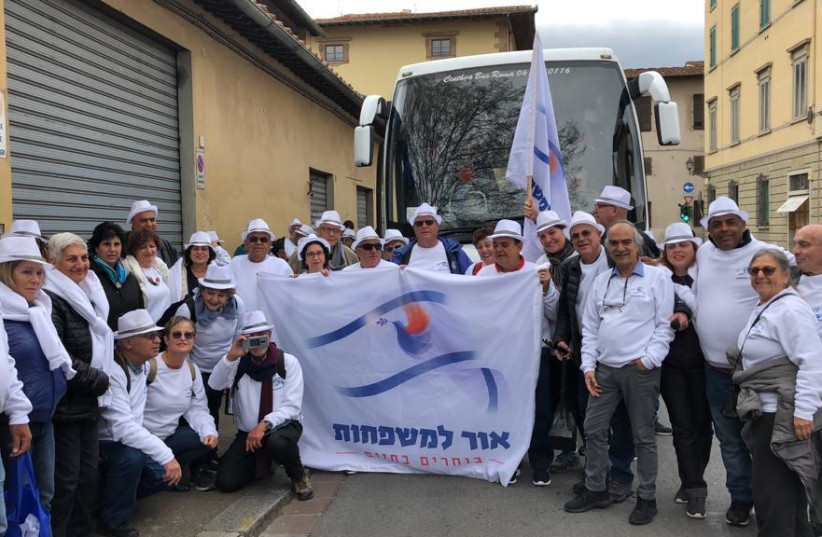At 8 pm on Tuesday evening May 3, a one-minute memorial siren will sound throughout the State of Israel, marking the beginning of Remembrance Day for the Fallen of Israel’s Wars and Victims of Terrorism. The next day, at 11 am, the siren will sound once more. The wailing sound lends an air of solemnity and gravity as people pause and stand silently in unity and support of those who have lost their loved ones who gave their lives for the survival of the State of Israel.
But once the sirens and the silence have passed, how do bereaved families cope with the sense of loss and resume their daily lives?
“Our goal,” says Irit Oren Gunders, head of Or Lamishpachot (A Light for Families), an Israeli non-profit organization that assists bereaved families, “is to bring them back to a daily routine. When a son or daughter dies during their IDF service, the parents’ lives fall apart – their careers, their relationship with their spouse, and their health. We need to strengthen them, and they need to know that the death of their child was not in vain. They need love and encouragement.”
While there are numerous organizations in Israel that deal with grieving and bereaved parents of fallen soldiers, Oren Gunders says hers does not deal with memorials and statues. “We sanctify life, and our relationship is personal with each family.”

She served in the IDF for 20 years, was a lieutenant-colonel, and was head of the Human Resources Division of the IDF Combat Engineering Corps between 2000 and 2004. “In the course of my military service, I knew soldiers who were sent on IDF missions and never returned,” Oren Gunders says. She visited bereaved parents, accompanied them during their mourning, and helped them during their most difficult hours.
Oren Gunders vividly recalls the abduction of three Israeli soldiers – Benny Avraham, Adi Avitan and Omar Souad – on October 7, 2000, from the Israeli side of the border with Lebanon. The three were killed shortly after their abduction, but their remains were not returned to Israel until 2004. In November 2001, Rabbi Israel Weiss, chief military rabbi, declared all three soldiers dead, thereby allowing their families to observe the shiva mourning practices. “The families of these three captives became my family,” says Oren Gunders. “I visited them every Shabbat, and I became attached to these families.”
Remembering long-dead soldiers whose faces and smiles remain fresh in her mind, Oren Gunders mentions Moshe Taranto, a combat engineer who was the head of counter-tunneling near the Gaza Strip. Taranto, who Oren Gunders says was an outstanding officer, was killed in November 2004 when a tunnel wall collapsed. At the time, Oren Gunders and her husband were in Singapore, where her husband was serving as a military attaché. “After his death, it took me 48 hours to recover,” she recalls, “and call his parents from Singapore.” Oren Gunders urged Taranto’s mother to try and maintain some semblance of normalcy. “Every Friday, I called his mother, and I urged her to light Shabbat candles, put flowers on the table, and set out a white tablecloth. She cried, and I tried to strengthen her.”
Oren Gunders and her husband returned from their position in Singapore after the outbreak of the Second Lebanon War in the summer of 2006. “After spending time in Singapore where everyone lives happily, here soldiers are dying and your soul explodes.”
Oren Gunders told her husband that she had to invite the Avitan, Avraham and Taranto families to their home to get them out of their houses, which they had not left due to the intense mourning over the loss of their children. She says that the evening, which began on a sad note with family members telling each other how they memorialized their children, gradually took on a happier tone. At midnight, the guests were still there.
“The next day,” says Oren Gunders, “they called me and said, ‘Because of you, we left our homes, and we actually laughed.’” She realized that she had managed to bring the bereaved parents out of their cocoon of mourning, if only for a few hours.
Oren Gunders told her husband, who himself enjoyed a long career in the IDF, to invite more families of soldiers who had died in IDF operations to their home. Her events began with 10 families and grew to 20 families. In the fall of 2007, Oren Gunders invited 100 guests to their home for a pre-Rosh Hashanah event. “The guests stayed and sang Rosh Hashanah songs,” she says. “It was inspiring and influenced my life and my family’s life.” Hanukkah 2007 was more of the same, as Oren Gunders once again organized an event for bereaved IDF family members.
In 2008, Or Lamishpachot was officially incorporated as a charitable organization, and since then, led by the indefatigable Oren Gunders, the organization has grown, helping 1,500 bereaved families return to the routine of daily life. The organization is propelled by hundreds of volunteers throughout the country dedicated to assisting bereaved families to emerge from their grief. In our interview that took place before Purim, Oren Gunders enthusiastically reports how hundreds of members of the Bnei Akiva youth movement visited thousands of families, bringing Purim goodies, along with a dedication to the family, in which they retold the story of their fallen son. The fact that the Bnei Akiva visitors studied and learned the stories of the fallen soldiers and discussed the events with the bereaved families does a great deal for them and ensures that their child is not forgotten.
Oren Gunders, who received the president’s award for volunteerism from Shimon Peres in 2013, is, in Israeli parlance, a “bulldozer” – a persistent person who does not take “no” for an answer, and who is constantly looking for a solution and a better way.
In the spring of 2020, when Israel was in the midst of the pandemic lockdown, bereaved parents could not visit the military cemeteries on Remembrance Day. Or Lamishpachot sent each family a small package consisting of an olive plant, chocolate, a flag, and flowers. She reports that parents were astounded to be remembered even during the midst of a national lockdown.
Or Lamishpachot subsists on private donations, and apart from Oren Gunders and a staff of six workers, who run the organization from her home, everything is done on a volunteer basis.
“It is a holy mission of love,” she says. “All of the money comes from people in Israel who love what we do and are drawn to it.”

The organization has also raised funds through Jewish communities in Italy and Switzerland, which have been used to sponsor trips to visit Jewish communities in cities such as Rome and Milan. Oren Gunders says that prior to the pandemic, the organization received donations and services worth approximately NIS 7 million each year. Since then, she reports, this amount has declined somewhat.
Or Lamishpachot organizes a variety of activities for bereaved parents throughout the year, including sing-alongs, cooking courses, tours both within Israel and outside the country, and bringing holiday gifts to families from volunteers.
Oren Gunders says that parents are not the only ones who suffer when a soldier falls. “The siblings of soldiers that have died are badly off, because they not only lost what is most precious to them, but they also lost their parents along the way,” she says. “No one relates to the siblings.” Or Lamishpachot honors surviving siblings every year at the organization’s dinner, in which scholarships are presented to siblings of fallen soldiers. “This year we distributed 114 scholarships, and with God’s help, we will reach 150 next year,” she says.
In addition, Oren Gunders adds, the organization has sessions that strengthen relationships between bereaved daughters-in-law and mothers, and special father-son and father-daughter days, where fathers spend the day with their children. “They usually go to memorial services together,” says Oren Gunders, so spending time with parents in a non-mourning situation is helpful for both parents and children.
The goal of Or Lamishpachot – bringing parents back to the routine of daily life – is not limited to rehabilitation. The organization supports parents who wish to expand their family after the loss of a son or daughter through surrogacy or fertility treatments. “I encourage bereaved parents to become pregnant after they have lost a child,” says Oren Gunders. “I am already a ‘grandmother’ to 29 children.” She says that parents receive financial and medical assistance from the organization as long as the mother is under 53.
Recently, the organization has emerged at the forefront of a bill introduced in the Knesset that would allow bereaved parents to utilize the sperm of their fallen sons with the hope of becoming grandparents.

The proposed bill, known as the continuity bill (in Hebrew: Hok Hahemshechiut), would permit soldiers to give their written permission to retrieve their sperm in the event of their demise. The spouse or the parents of a fallen soldier could request retrieval of the sperm within 72 hours of his death. Oren Gunders says that she has been working on the proposal for four years, and in March, the bill passed a preliminary reading in the Ministerial Committee for Legislation. “As long as it could benefit someone who lost a son and will provide a benefit, I think we should allow it,” she says.
For bereaved parents, Irit Oren Gunders has changed the perception of grief and bereavement in Israel, encouraging parents and siblings of fallen soldiers to continue living while remembering the loss of their children. “Death is final,” she says. “All one can do is provide love and hold their hand. As long as we remember their child, he remains alive. We say, ‘you are not alone – we are obligated to you, and your crown did not fall after your child’s death.’”
Perhaps a bereaved father, who lost two children in the course of military service, and who himself lost a brother years earlier, put it best. “You taught me to get up,” he told Oren Gunders, “to dance, and to sing.” Or Lamishpachot helps bereaved IDF families resume the dance and song of life – sometimes painfully, but with meaning and with love. ■
